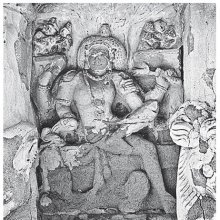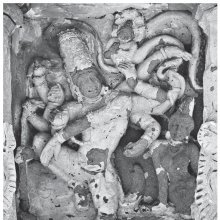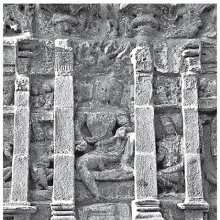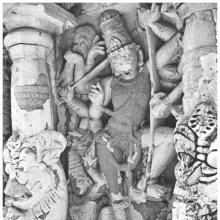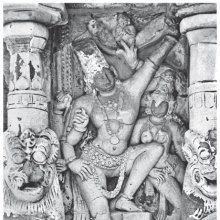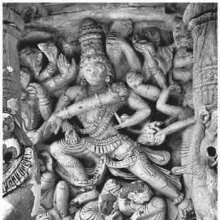Au, Āū: 14 definitions
Introduction:
Au means something in Hinduism, Sanskrit, Marathi, Jainism, Prakrit, Hindi, Tamil. If you want to know the exact meaning, history, etymology or English translation of this term then check out the descriptions on this page. Add your comment or reference to a book if you want to contribute to this summary article.
Images (photo gallery)
(+77 more images available)
In Hinduism
Vyakarana (Sanskrit grammar)
Source: Wikisource: A dictionary of Sanskrit grammar1) Au (औ).—The vowel औ; diphthong vowel made up of आ (ā) and ओ;
2) Au.—The substitute औ (au) for the final letter उ (u) of the word मनु (manu) before the fem, affix ई; cf. मनोः स्त्री मनायी, मनावी,मनुः (manoḥ strī manāyī, manāvī, manuḥ) Kāś. on P. IV. 1. 38;
3) Au.—Case ending of the nom. and acc. dual called औङ् (auṅ) also.

Vyakarana (व्याकरण, vyākaraṇa) refers to Sanskrit grammar and represents one of the six additional sciences (vedanga) to be studied along with the Vedas. Vyakarana concerns itself with the rules of Sanskrit grammar and linguistic analysis in order to establish the correct context of words and sentences.
Purana and Itihasa (epic history)
Source: archive.org: Puranic EncyclopediaAu (औ).—This word means Maheśvara (Śiva). (Agni Purāṇa, Chapter 348).

The Purana (पुराण, purāṇas) refers to Sanskrit literature preserving ancient India’s vast cultural history, including historical legends, religious ceremonies, various arts and sciences. The eighteen mahapuranas total over 400,000 shlokas (metrical couplets) and date to at least several centuries BCE.
Languages of India and abroad
Marathi-English dictionary
Source: DDSA: The Molesworth Marathi and English Dictionaryāū (आऊ).—f (āī or ambā Mother.) A term of courtesy in addressing or making mention of a Shudra woman, corresponding to Dame, good woman, mistress, mother.
--- OR ---
āū (आऊ).—f (Imit.) Moaning. 2 Objecting, demurring, scrupling. 3 Utterance or suppressed exclamation (as of one under a beating).
--- OR ---
au (औ).—
--- OR ---
au (औ).—The eleventh vowel, corresponding with Ou in House, and here written Ou.
Source: DDSA: The Aryabhusan school dictionary, Marathi-Englishāū (आऊ).—f Moaning. Objecting.
--- OR ---
au (औ).—The fourteenth vowel.
Marathi is an Indo-European language having over 70 million native speakers people in (predominantly) Maharashtra India. Marathi, like many other Indo-Aryan languages, evolved from early forms of Prakrit, which itself is a subset of Sanskrit, one of the most ancient languages of the world.
Sanskrit dictionary
Source: DDSA: The practical Sanskrit-English dictionaryAu (औ).—m.
1) A sound.
2) Name of Śeṣa or Ananta.
3) The number जलधि (jaladhi); cf. also औः श्वा युवा नरो नारी भावः सूक्ष्मः प्रजापतिः । स्थूलो जारः कलावांश्च सुखी दुर्गा रतिः कविः (auḥ śvā yuvā naro nārī bhāvaḥ sūkṣmaḥ prajāpatiḥ | sthūlo jāraḥ kalāvāṃśca sukhī durgā ratiḥ kaviḥ) || Enm.
4) The sacred syllable of the Śūdras; Kālikā P. -f. The earth. -ind. An interjection of (1) calling (ho, hallo); (2) addressing (oh !); (3) opposition; (4) asseveration or determination.
Source: Cologne Digital Sanskrit Dictionaries: Shabda-Sagara Sanskrit-English DictionaryAu (औ).—The diphthong Au or Ou, having the same sound as in Our, and considered as the fourteenth vowel of the Nagari alphabet.
--- OR ---
Au (औ).—ind. An interjection of, 1. Calling, (ho! hola.) 2. Of addressing, (the vocative particle oh.) 3. A particle of prohibition, and 4. Of asseveration.
--- OR ---
Au (औ).—m. (auḥ) The serpent Ananta. f. (auḥ) The earth.
--- OR ---
Au (औ).—ind. The mystical prefix proper for Sudras: see om.
Source: Cologne Digital Sanskrit Dictionaries: Monier-Williams Sanskrit-English Dictionary1) Au (औ):—1. au the fourteenth vowel of the alphabet (having the sound of English ou in our).
2) 2. au ind. an interjection
3) a particle of addressing
4) calling
5) prohibition
6) ascertainment, [cf. Lexicographers, esp. such as amarasiṃha, halāyudha, hemacandra, etc.]
7) 3. au m. Name of Ananta or Śeṣa, [cf. Lexicographers, esp. such as amarasiṃha, halāyudha, hemacandra, etc.]
8) a sound, [cf. Lexicographers, esp. such as amarasiṃha, halāyudha, hemacandra, etc.]
9) the Setu or sacred syllable of the Śūdras, [Kālikā-purāṇa] ([Tārānātha tarkavācaspati’s Vācaspatyam, Sanskrit dictionary])
10) f. (aus) the earth, [cf. Lexicographers, esp. such as amarasiṃha, halāyudha, hemacandra, etc.]
Source: Cologne Digital Sanskrit Dictionaries: Yates Sanskrit-English Dictionary1) Au (औ):—The 14th vowel or diphthong of the alphabet, au or ow in cow.
2) interj. oh! ho!
3) (auḥ) m. A serpent, Ananta.
4) The mystic prefix for Sūdras.
[Sanskrit to German]
Sanskrit, also spelled संस्कृतम् (saṃskṛtam), is an ancient language of India commonly seen as the grandmother of the Indo-European language family (even English!). Closely allied with Prakrit and Pali, Sanskrit is more exhaustive in both grammar and terms and has the most extensive collection of literature in the world, greatly surpassing its sister-languages Greek and Latin.
Hindi dictionary
Source: DDSA: A practical Hindi-English dictionaryAu (औ):——the tenth vowel and the tenth letter of the Devnagri: alphabet (exclusive of [ṛ] and [lṛ] which are not accepted as Hindi vowels by modern phoneticians).
...
Prakrit-English dictionary
Source: DDSA: Paia-sadda-mahannavo; a comprehensive Prakrit Hindi dictionaryĀu (आउ) in the Prakrit language is related to the Sanskrit word: Āyuṣ.
Āu has the following synonyms: Āua.
Prakrit is an ancient language closely associated with both Pali and Sanskrit. Jain literature is often composed in this language or sub-dialects, such as the Agamas and their commentaries which are written in Ardhamagadhi and Maharashtri Prakrit. The earliest extant texts can be dated to as early as the 4th century BCE although core portions might be older.
Kannada-English dictionary
Source: Alar: Kannada-English corpusAu (ಔ):—[noun] the fourteenth letter of the alphabet (a union of two vowels 'ಅ'and'ಉ' pronounced in one syllable).
Kannada is a Dravidian language (as opposed to the Indo-European language family) mainly spoken in the southwestern region of India.
Tamil dictionary
Source: DDSA: University of Madras: Tamil LexiconAu (ஔ) . The 12th vowel, diphthong of a and u; பன்னிரண்டாம் உயிரெழுத்து. [pannirandam uyirezhuthu.]
--- OR ---
Au (ஔ) noun The symbol representing the seventh note of the gamut, usually ni; தாரவிசையி னெழுத்து. (திவா.) [tharavisaiyi nezhuthu. (thiva.)]
Tamil is an ancient language of India from the Dravidian family spoken by roughly 250 million people mainly in southern India and Sri Lanka.
See also (Relevant definitions)
Starts with (+1079): Aua, Auamga, Auar, Auau, Auauaukara, Auauloi, Aubergine, Aubi etek, Aubja, Aubry, Aucaka, Aucanam, Aucathya, Auccaihshravasa, Auccamanyava, Auccha, Auccha, Aucchana, Aucchana, Aucchiya.
Ends with (+797): Abakhau, Abau, Abdhijau, Abhijidvishvajitau, Abhividhau, Abrukhau, Adau, Adgau, Adityacandrau, Adityachandrau, Adkau, Agau, Aghau, Agnamarutau, Agnindrau, Agniparjanyau, Agnishomau, Agnivarunau, Agrau, Agubarau.
Full-text (+231): Aum, Aukara, Kshudh, Shankha, O, Bhanj, Tyaj, Khid, Samaharavarna, Krudh, Nah, Dih, Vyadh, Dah, Duh, Lup, Tud, Lip, Ayus, Kanaka.
Relevant text
One of your search terms exceeds the minimun character amount per search term. This amount currently equals 2.
No search results for Au, Āū, Āu in any book or story.
